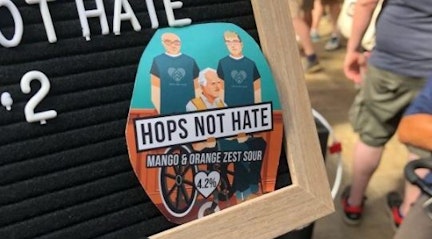Gipsy Hill
-
Case Studies

8 ways pubs and bars can be more accessible for people with disabilities
It’s the end of Dry January and perhaps you’re contemplating a well-deserved trip to the pub. However a lot of venues in the UK don’t accommodate for people who have disabilities. It can be tough to implement changes when you don’t know where to start, but there are simple and effective things that any venue can do to make their environment friendlier for everyone.
Last year, we collaborated with South London brewers Gipsy Hill to create some guidelines to help venues become more accessible and inviting for people with disabilities.
- Ask for feedback from people who have lived experience. Here at Certitude, we believe in asking people what they need and want, rather than telling them
- Be clever with your space; think about where furniture goes and what this means for access
- Have a lowered part of your bar that’s easily reached by anyone that may have limited movement or be a wheelchair user
- Raise your tables. Many tables do not comfortably fit wheelchairs
- If you are accessible, tell people! Update your website and social media. Venues that are totally accessible can seem rare
- Step free access, i.e. lifts, ramps and level surfaces
- Make your menus according to Easy Read Guidelines – small changes like making font size 16 or larger can make a big change
- Knowledge is power. Train your staff so that they have the confidence to serve a variety of people. Courses such as Mental Health Awareness, Sign Language and Person-Centred Care Approach can make a world of difference to both staff and customers.
- There are other steps you can take, such as making sure your accessible loo is available and ready to use, not filled with stock or junk, and equipped with things like an emergency cord and grab rails.
Visit Britain has also released information about how pubs and venues can be made more accessible, which has more tips such as:
Name an access champion or ensure that a colleague takes responsibility for developing access. Use the Champion Brief at www.visitengland.org/access
Think about purchasing specific equipment to assist those with access needs, for example hearing loops and large print menus
Take steps to reduce sensory overload. Autistic people can be sensitive to lights, sounds, smells and sights. This can lead to an overload. Lots of little things can add up to an overload of sensory information. Which means little things from you can cut this down. Try to avoid talking over each other, turn down your music, or even just offer to dim glaring lights.
The National Autistic Society has also released a lot of information about how to make venues more accessible for people with autism.
If you are wondering if a venue is going to be comfortable for you to visit, there are some companies that verify their accessibility. The National Autistic Society’s Autism Friendly Award recognises businesses and venues that are committed to improving autistic people’s access to their sites and services. Look out for their tick which shows that the venue or business has committed to making sure they can give the same warm welcome to everyone.